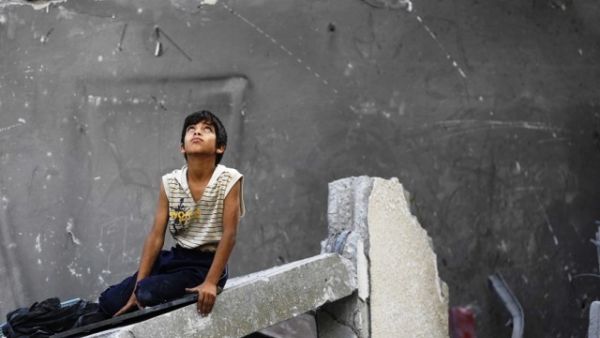The Palestinian Minister of Housing and Public Works announced Tuesday that reconstruction of the Gaza Strip has “started and will not stop” until all the homes destroyed by Israeli forces during its latest offensive on Gaza have been rebuilt.
Minister Mufid al-Hasayneh laid the first brick of the reconstruction effort at a home of a Palestinian family in al-Shujaiyya, an area east of Gaza City that was one of the worst hit by Israeli shelling during the war.
“We are here today in front of the Harara family home to declare starting actual reconstruction of the Gaza Strip," Hasayneh said.
The Harara home is the first to be reconstructed in the neighborhood, where the majority of residents were forced to flee their homes last summer due to heavy fighting between Hamas fighters and Israeli forces in what would later be known as the "Battle of Shujaiyya."
A UN Commission of Inquiry reported last month that Israeli forces carried out indiscriminate attacks against family homes during the operation into the neighborhood.
"We will not abandon our responsibilities and will continue our work until all houses destroyed by Israel are reconstructed.”
Hasayneh said engineering, technical and administrative crews of the ministry are working day and night to serve the owners of destroyed houses, and others affected.
Hasayneh thanked Saudi Arabia, Qatar, Kuwait, Egypt, Jordan, Malaysia and all Arab and Islamic countries for their efforts in supporting Palestinians and the reconstruction of the Gaza Strip.
The 50-day war in July-August 2014 killed over 2,200 Palestinians, 73 on the Israeli side, and destroyed or damaged tens of thousands of homes in the besieged Gaza Strip.
Until now the only repairs have been to homes which were partially damaged, while 18,000 totally destroyed houses remain in ruins.
Israel's ongoing blockade of Gaza, now in its ninth year, has been blamed for the slow progress due to strict limitations on materials entering the strip.
Lack of international donor support for the territory has also been a significant factor in near-stagnant reconstruction rates.
"The march towards real reconstruction of the Gaza Strip has begun, and nothing will stop it," Hasayneh said.
"We will see a lot of movement on the reconstruction front in the coming days. We will rebuild all homes destroyed by Israel," he added.
But the process is expected to take years in the war-torn coastal enclave, whose 1.8 million residents have seen three wars in six years between Israel and Palestinian militants.
Palestinian refugee agency UNRWA has said that so far it only received enough money for 200 out of the 7,000 houses it is tasked with rebuilding.
Donations pledged at an international conference in Cairo in October have been slow to arrive, and the blockade that has choked Gaza for years is still in place.
Israel controls two of the three goods and personnel crossings into the enclave, and Egypt controls a third.
Israel says more than 1.1 million tonnes of construction material have been allowed in since October through the Kerem Shalom goods crossing.
Egypt last month allowed cement supplies to be brought in through the Rafah crossing.
Critics of the blockade have called for it to be fully lifted to accelerate reconstruction, warning that an ongoing humanitarian crisis could fuel further conflict.
AFP contributed to this report.








